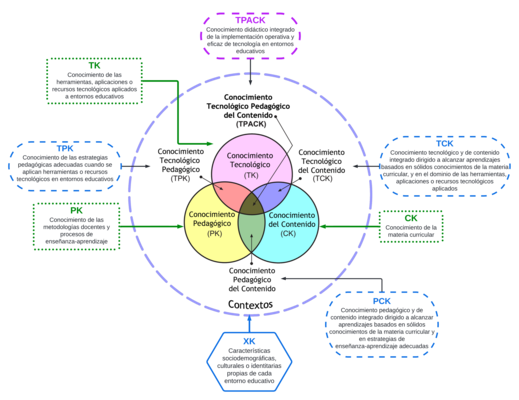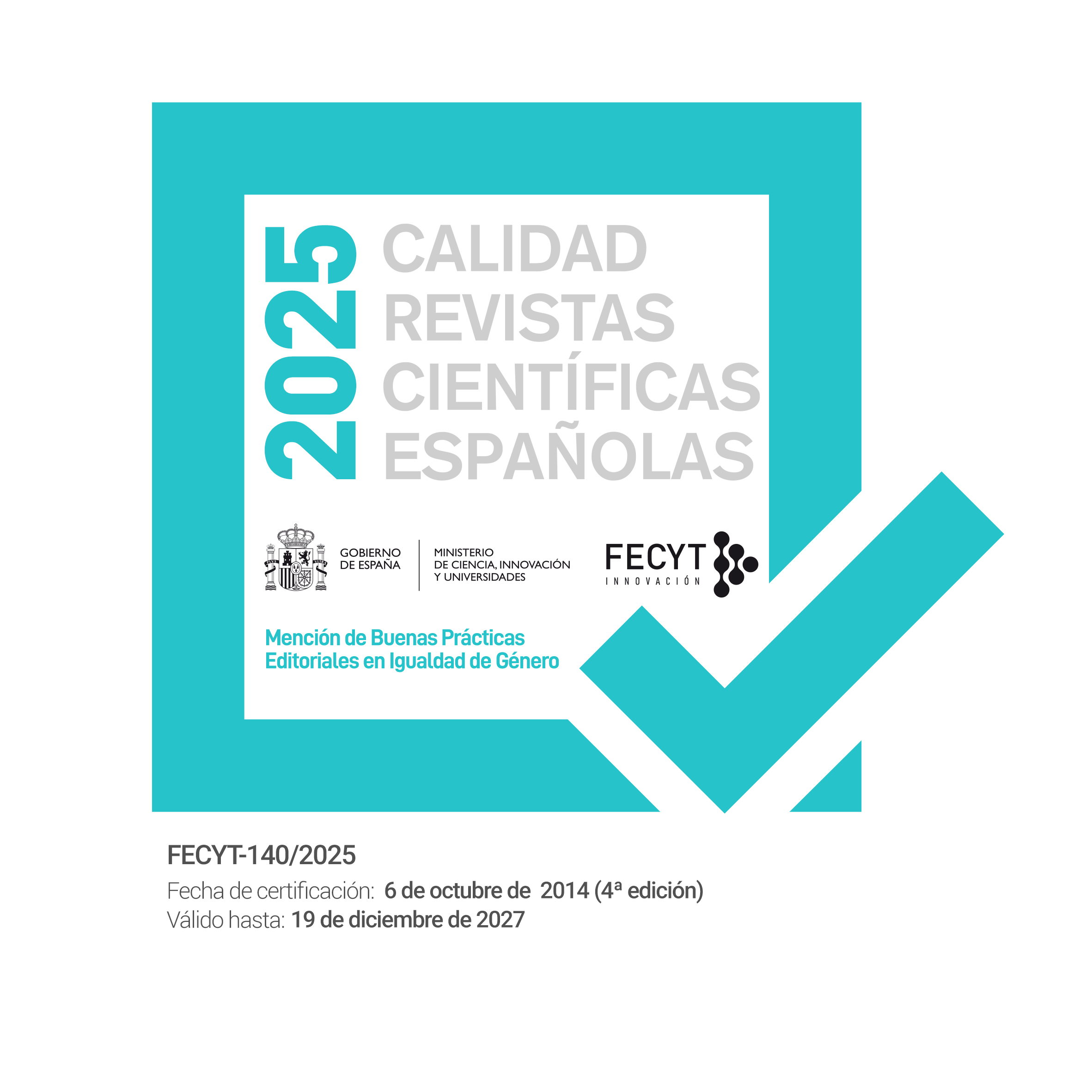Psychometric validation of the scale Technological Pedagogical Knowledge of Content TPACK-ES and assessment of self-efficacy perceived by prospective teachers
DOI:
https://doi.org/10.5944/educxx1.34484Keywords:
TPACK, validation, digital gap, higher education, teacher trainingAbstract
Despite the usefulness of the analysis of the perception of self-efficacy in the success and performance of teachers and students in the teaching-learning process proposed by the TPACK (Technological Pedagogical Content Knowledge) model, there is little research focused on the beliefs and perceptions of future teachers. The present research has a double objective: on the one hand, it seeks to validate the psychometric properties of the TPACK-ES scale in the Spanish context; and on the other hand, to analyse the perceptions of self-efficacy in the model of Primary and Secondary Education teachers in initial training. A total of 303 university students with a mean age of 23.12 ± 3.21 years, enrolled in a university in the north of Spain, agreed to participate in this study. The results obtained confirm the heptafactorial structure of the model, its internal consistency, structural stability and adaptation to optimal fit indices. Likewise, statistically significant differences are identified in the TK and TPK dimensions, in structuring variables of the model and in the PK (pedagogical knowledge), PCK (pedagogical knowledge of content), TPK (pedagogical technological knowledge) and TPACK dimensions, depending on the level of teacher training and the gender of the future teacher. These results indicate the need to continue to analyse the contextual factors of the TPACK model in order to ensure its suitability and true effectiveness in initial teacher training.
Downloads
References
Abalo, J., Lévy, J. P., Rial, A., & Varela, J. (2006). Invarianza factorial con muestras múltiples. En J. P. Lévy, & J. Varela (Coords.), Modelización con estructuras de covarianzas en ciencias sociales: Temas esenciales, avanzados y aportaciones especiales (pp. 259-278). Netbiblo.
Aktaş, I., & Özmen, H. (2020). Investigating the impact of TPACK development course on pre-service science teachers’ performances. Asia Pacific Education Review, 21(4), 667-682. https://doi.org/10.1007/s12564-020-09653-x
Al-Abdullatif, A. M. (2019). Auditing the TPACK confidence of pre-service teachers: The case of Saudi Arabia. Education and Information Technologies, 24, 3393−3413. https://doi.org/10.1007/s10639-019-09924-0
Ali, S., & Hawk, N. (2022). Examining teachers’ perceptions of TPACK in culturally diverse classroom. En T. Bastiaens (Ed.), Proceedings of EdMedia + Innovate Learning (pp. 218-221). Association for the Advancement of Computing in Education (AACE). https://cutt.ly/f88q33z
Alpaslan, M. M., Ulubey, Ö., & Ata, R. (2021). Adaptation of Technological Pedagogical Content Knowledge Scale into Turkish culture within the scope of 21st century skills. Psycho-Educational Research Reviews, 10(1), 77–91. https://cutt.ly/m88q6Sz
Anderson, J. C., & Gerbing, D. W. (1988). Structural equation modeling in practice: A review and recommended two-step approach. Psychological Bulletin, 103(3), 411-423. https://doi.org/10.1037/0033-2909.103.3.411
Anderson, S. E., & Kyzar, K. B. (2022). Between school and home: TPACK-in-practice in elementary special education contexts. Computers in the Schools, 39(4), 323–341. https://doi.org/10.1080/07380569.2022.2086738
Assis, M. dos S. de, & Vieira-Santos, J. (2021). Conhecimento tecnológico e pedagógico do conteúdo (TPACK) na construção do saber docente virtual: uma revisão sistemática. Acta Scientiarum. Education, 43(1), Artículo e51998. https://doi.org/10.4025/actascieduc.v43i1.51998
Ato, M., López-García, J. J., & Benavente, A. (2013). Un sistema de clasificación de los diseños de investigación en psicología. Anales de Psicología, 29(3), 1038–1059. https://doi.org/10.6018/analesps.29.3.178511
Bentler, P. M. (1989). EQS structural equations program manual. BMDP Statistical Software.
Beri, N., & Sharma, L. (2019). A study on technological and content knowledge among teacher-educators in Punjab region. International Journal of Engineering and Advanced Technology, 8(5), 1306-1312. https://doi.org/10.35940/ijeat.E1186.0585C19
Cabero, J. (2014). La formación del profesorado en TIC: modelo TPACK. Plubidisa.
Cabero, J., & Martínez, A. (2019). Las TIC y la formación inicial de los docentes. Modelos y competencias digitales. Profesorado. Revista de Currículum y Formación del Profesorado, 23(3), 247-268. https://doi.org/10.30827/profesorado.v23i3.9421
Castéra, J., Marre, C. C., Yok, M. C. K., Sherab, K., Impedovo, M. A., Sarapuu, T., Delserieys Pedregosa, A., Khatoon Malik, S., & Armand, H. (2020). Self-reported TPACK of teacher educators across six countries in Asia and Europe. Education and Information Technologies, 25(4), 3003–3019. https://doi.org/10.1007/s10639-020-10106-6
Cetin-Berber, D., & Erdem, A. R. (2015). An investigation of Turkish pre-service teachers’ technological, pedagogical and content knowledge. Computers, 4(3), 234-250. https://doi.org/10.3390/computers4030234
Chai, C. S., Koh, J. H. L., & Tsai, C. C. (2016). A review of the quantitative measures of technological pedagogical content knowledge (TPACK). En M. C. Herring, M. J. Koehler, & P. Mishra (Eds.), Handbook of technological pedagogical content knowledge (TPACK) for educators (pp. 87-106). Routledge. https://doi.org/10.4324/9781315771328
Chen, Y., & Cao, L. (2022). Promoting maker-centred instruction through virtual professional development activities for K-12 teachers in low-income rural areas. British Journal of Educational Technology, 53(4), 1025-1048. https://doi.org/10.1111/bjet.13183
Cheng, S. L., & Xie, K. (2018). The relations among teacher value beliefs, personal characteristics, and TPACK in intervention and non-intervention settings. Teaching and Teacher Education, 74, 98–113. https://doi.org/10.1016/j.tate.2018.04.014
Ciriza-Mendívil, C., Lacambra, A., & Hernández de la Cruz, J. (2022). Technological pedagogical content knowledge: Implementation of a didactic proposal for preservice history teachers. Frontiers in Education, 7, Artículo 852801. https://doi.org/10.3389/feduc.2022.852801
Curran, P. J., West, S. G., & Finch, J. F. (1996). The robustness of test statistics to nonnormality and specification error in confirmatory factor analysis. Psychological Methods, 1(1), 16–29. https://doi.org/10.1037/1082-989X.1.1.16
De las Cuevas, C., & González de Rivera, J. L. (1992). Autoinformes y respuestas sesgadas. Anales de Psiquiatría, 8(9), 362–366.
Diamah, A., Rahmawati, Y., Paristiowati, M., Fitriani, E., Irwanto, I., Dobson, S., & Sevilla, D. (2022). Evaluating the effectiveness of TPACK-based training program in enhancing pre-service teachers’ perceptions of TPACK. Frontiers in Education, 7, 1-27. https://doi.org/10.3389/feduc.2022.897447
Fernández-Chávez, C., Domínguez-Ramírez, P., & Salcedo-Lagos, P. (2022). Validación de aplicación del modelo TPACK, asociado a las habilidades conciencia fonológica y conocimiento de letras para educadoras de parvularios. Revista Electrónica Educare, 26(3), 1-20. https://doi.org/10.15359/ree.26-3.8
Fernández-Hernández, J. L., Herranz-Hernández, P., & Segovia-Torres, L. (2022). Validación cruzada sobre una misma muestra: una práctica sin fundamento. R.E.M.A. Revista Electrónica de Metodología Aplicada, 24(1), 38-40. https://doi.org/10.17811/rema.24.1.2022.38-40
Frías-Navarro, D., & Pascual-Soler, M. (2022). Lectura crítica y recomendaciones para redactar el informe de investigación. Palmero Ediciones. https://doi.org/10.17605/osf.io/kngtp
Gebhardt, E., Thomson, S., Ainley, J., & Hillman, K. (2019). Gender differences in computer and information literacy. An In-depth analysis of data from ICILS. Springer. https://doi.org/10.1007/978-3-030-26203-7_1
Gisbert-Cervera, M., Usart, M., & Lázaro-Cantabrana, J. L. (2022). Training pre-service teachers to enhanced digital education. European Journal of Teacher Education, 45(4), 532–547. https://doi.org/10.1080/02619768.2022.2098713
Henseler, J., Ringle, C. M., & Sarstedt, M. (2015). A new criterion for assessing discriminant validity in variance-based structural equation modeling. Journal of Academy of Marketing Science, 43(1), 115-135. https://doi.org/10.1007/s11747-014-0403-8
Hu, L., & Bentler, P. M. (1999). Cutoff criteria for fit indexes in covariance structure analysis: Conventional criteria versus new alternatives. Structural Equation Modeling: A Multidisciplinary Journal, 6(1), 1-55. http://dx.doi.org/10.1080/10705519909540118
Huang, J. L., & Wang, Z. (2021). Careless responding and insufficient effort responding. Oxford Research Encyclopedia of Business and Management. https://doi.org/10.1093/acrefore/9780190224851.013.303
Huang, K., Chen, Y., & Jang, S. (2020). TPACK in special education schools for SVI: A comparative study between Taiwanese and Chinese in-service teachers. International Journal of Disability, Development and Education, 69(2), 435-450. https://doi.org/10.1080/1034912x.2020.1717450
Huang, X., Huang, L., & Lajoie, S. P. (2022). Exploring teachers’ emotional experience in a TPACK development task. Educational Technology Research and Development, 70(4), 1283–1303. https://doi.org/10.1007/s11423-022-10135-7
Ibrohim, I., Purwaningsih, E., Munzil, M., Hidayanto, E., Sudrajat, A., Saefi, M., & Hassan, Z. (2022). Possible links between Indonesian science teacher’s TPACK perception and demographic factors: Self-reported survey. Eurasia Journal of Mathematics, Science and Technology Education, 18(9), Artículo em2146. https://doi.org/10.29333/ejmste/12282
Ismaeel, D. A., & Al Mulhim, E. N. (2022). E-teaching internships and TPACK during the Covid-19 Crisis: The case of Saudi pre-service teachers. International Journal of Instruction, 15(4), 147-166. https://doi.org/10.29333/iji.2022.1549a
Janssen, N., Knoef, M., & Lazonder, W. (2019) Technological and pedagogical support for pre-service teachers’ lesson planning. Technology, Pedagogy and Education, 28(1), 115-128. https://doi.org/10.1080/1475939X.2019.1569554
Jiménez, M. J., & Cabero, J. (2021). Los conocimientos tecnológicos, pedagógicos y de contenidos del profesorado universitario andaluz sobre las TIC. Análisis desde el modelo TPACK. Innoeduca. International Journal of Technology and Educational Innovation, 7(1), 4-18. https://doi.org/10.24310/innoeduca.2021.v7i1.11940
Joldanova, D., Tleuzhanova, G., Kitibayeva, A., Smanova, G., & Mirza, N. (2022). Formation of TPACK and acmeological competency of future teachers in foreign language education. International Journal of Education in Mathematics, Science, and Technology (IJEMST), 10(4), 935-954. https://doi.org/10.46328/ijemst.2717
Jöreskog, K. G., & Sörbom, D. (1993). LISREL 8: Structural equation modeling with the SIMPLIS command language. Lawrence Erlbaum Associates Publishers.
Kadioglu-Akbulut, C., Cetin-Dindar, A., Kucuk, S., & Acar-Sesen, B. (2020). Development and validation of the ICT-TPACK-science scale. Journal of Science Education and Technology, 29(3), 355-368. https://doi.org/10.1007/s10956-020-09821-z
Kartal, B., & Çınar, C. (2022). Preservice mathematics teachers’ TPACK development when they are teaching polygons with geogebra. International Journal of Mathematical Education in Science and Technology, 1-33. https://doi.org/10.1080/0020739x.2022.2052197
Koh, J. H. L., Chai, C. S., & Tsai, C. C. (2010). Examining the technological pedagogical content knowledge of Singapore pre-service teachers with a large-scale survey. Journal of Computer Assisted Learning, 26(6), 563-573. https://doi.org/10.1111/j.1365-2729.2010.00372.x
Kulaksız, T., & Karaca, F. (2022). Elaboration of science teachers’ technology-based lesson practices in terms of contextual factors influencing TPACK. Research in Science & Technological Education, 1-21. https://doi.org/10.1080/02635143.2022.2083598
Lachner, A., Fabian, A., Franke, U., Preiß, J., Jacob, L., Führer, C., Küchler, U., Paravicini, W., Randler, C., & Thomas, P. (2021). Fostering pre-service teachers’ technological pedagogical content knowledge (TPACK): A quasi-experimental Field Study. Computers & Education, 174, 104304. https://doi.org/10.1016/j.compedu.2021.104304
Leal, L., & Rojas, J. (2020). Percepciones de autoeficacia y conocimientos TPACK en profesores en formación. Diversitas, 16(2). https://doi.org/10.15332/22563067.6295
Lee, S. W., & Lee, E. A. (2020). Teacher qualification matters: The association between cumulative teacher qualification and students’ educational attainment. International Journal of Educational Development, 77, Artículo 102208. https://doi.org/10.1016/j.ijedudev.2020.102218
Lévy, J-P., & Varela, J. (2006). Modelización con estructuras de covarianzas en ciencias sociales: Temas esenciales, avanzados y aportaciones especiales. Netbiblo.
Liu, B. (2022). Exploring secondary mathematics teachers’ TPACK development and student-centred Beliefs [Ponencia de congreso]. Proceedings of the 2022 8th International Conference on Humanities and Social Science Research (ICHSSR 2022), Congqing, China. https://doi.org/10.2991/assehr.k.220504.057
Long, T., Zhao, G., Li, X., Zhao, R., Xie, K., & Duan, Y. (2020). Exploring Chinese in-service primary teachers’ Technological Pedagogical Content Knowledge (TPACK) for the use of thinking tools. Asia Pacific Journal of Education, 42(2), 350-370. https://doi.org/10.1080/02188791.2020.1812514
Manokore, V., & Kuntz, J. (2022). TPACK tried and tested: Experiences of post-secondary educators during COVID-19 pandemic. International Journal for the Scholarship of Teaching and Learning, 16(2), 1-13. https://doi.org/10.20429/ijsotl.2022.160214
Mishra, P. (2019). Considering contextual knowledge: The TPACK diagram gets an upgrade. Journal of Digital Learning in Teacher Education, 35(2), 76-78. https://doi.org/10.1080/21532974.2019.1588611
Mishra, P., & Koehler, M. J. (2008). Introducing technological pedagogical content knowledge. [Ponencia de congreso]. Annual Meeting of the American Educational Research Association, Nueva York.
Morgan, A., Sibson, R., & Jackson, D. (2022). Digital demand and digital deficit: Conceptualising digital literacy and gauging proficiency among higher education students. Journal of Higher Education Policy and Management, 44(3), 258–275. https://doi.org/10.1080/1360080x.2022.2030275
Napitupulu, E., & Sebayang, N. (2022). TPACK learning model design needs analysis for 21st century skills. Journal of Positive School Psychology, 6(6), 9278-9284. https://cutt.ly/s85N45I
Nazari, N., Nafissi, Z., Estaji, M., Marandi, S. S., & Wang, S. (2019). Evaluating novice and experienced EFL teachers’ perceived TPACK for their professional development. Cogent Education, 6(1), Artículo 1632010. https://doi.org/10.1080/2331186X.2019.1632010
Oda, K., Herman, T., & Hasan, A. (2020). Properties and impacts of TPACK-based GIS professional development for in-service teachers. International Research in Geographical and Environmental Education, 29(1), 40–54. https://doi.org/10.1080/10382046.2019.1657675
Ortega-Sánchez, D., & Gómez-Trigueros, I. M. (2020). MOOCs and NOOCs in the training of future geography and history teachers: A comparative cross-sectional study based on the TPACK model. IEEE Access, 8, 4035–4042. https://doi.org/10.1109/access.2019.2963314
Ortiz-Colón, A., Ágreda Montoro, M., & Rodríguez Moreno, J. (2020). Autopercepción del profesorado de educación primaria en servicio desde el modelo TPACK. Revista Electrónica Interuniversitaria de Formación del Profesorado, 23(2), 53-65. https://doi.org/10.6018/reifop.415641
Otzen, T., & Manterola, C. (2017). Técnicas de muestreo sobre una población a estudio. International Journal of Morphology, 35(1), 227–232. https://doi.org/10.4067/s0717-95022017000100037
Pozas, M., & Letzel, V. (2021). “Do you think you Have what it takes?” – Exploring predictors of pre-service teachers’ prospective ICT use. Technology, Knowledge and Learning. https://doi.org/10.1007/s10758-021-09551-0
Rens van de Schoot, P. l., & Hox, J. (2012). A checklist for testing measurement invariance. European Journal of Developmental Psychology, 9(4), 486-492. https://doi.org/10.1080/17405629.2012.686740
Roussinos, D., & Jimoyiannis, A. (2019). Examining primary education teachers’ perceptions of TPACK and the related educational context factors. Journal of Research on Technology in Education, 51(4), 377-397. https://doi.org/10.1080/15391523.2019.1666323
Schmidt-Crawford, D. A., Baran, E., Thompson, A. D., Mishra, P., Koehler, M. J., & Shin, T. S. (2009). Technological pedagogical content knowledge (TPACK): The development and validation of an assessment instrument for preservice teachers. Journal of Research on Technology in Education, 42(2), 123-149. https://doi.org/10.1080/15391523.2009.10782544
Schmidt-Crawford, M., Brianza, E., & Petko, D. (2020). Developing a short assessment instrument for technological pedagogical content knowledge (TPACK.xs) and comparing the factor structure of an integrative and a transformative model. Computers and Education, 157, 103967. https://doi.org/10.1016/j.compedu.2020.103967
Schmidt-Crawford, M., Brianza, E., & Petko, D. (2021). Self-reported technological pedagogical content knowledge (TPACK) of pre-service teachers in relation to digital technology use in lesson plans. Computers in Human Behavior, 115, 106586. https://doi.org/10.1016/j.chb.2020.106586
Schumacker, R. E., & Lomax, R. G. (2015). A beginner’s guide to structural equation modeling. Routledge. https://doi.org/10.4324/9781315749105
Sun, J., Ma, H., Zeng, Y., Han, D., & Jin, Y. (2022). Promoting the AI teaching competency of K-12 computer science teachers: A TPACK-based professional development approach. Education and Information Technologies. https://doi.org/10.1007/s10639-022-11256-5
Tan, J. S. H., & Chen, W. (2022). Spiral model of collaborative lesson design: A model to develop TPACK and TEL design competency in pre-service teachers. En A. Weinberger, W. Chen, D. Hernandez-Leo, & B. Chen (Eds.), Proceedings of the 15th Computer-Supported Collaborative Learning: CSCL 2022 (pp. 91-98). International Society of the Learning Sciences.
Tondeur, J., Scherer, R., Siddiq, F., & Baran, E. (2019). Enhancing pre-service teachers’ technological pedagogical content knowledge (TPACK): a mixed-method study. Educational Technology Research and Development, 68(1), 319-343. https://doi.org/10.1007/s11423-019-09692-1
Wang, Y., Gu, X., & Liu, S. (2020). The investigation and analysis of pre-service teachers toward TPACK competencies. Open Journal of Social Sciences, 8(12), 327-339. https://doi.org/10.4236/jss.2020.812027
Widyasari, F., Masykuri, M., Mahardiani, L., Saputro, S., & Yamtinah, S. (2022). Measuring the effect of subject-specific pedagogy on TPACK through Flipped learning in e-learning classroom. International Journal of Instruction, 15(3), 1007-1030. https://doi.org/10.29333/iji.2022.15354a
Yanpar Yelken, T., Ergen, B., & Kanadli, S. (2019). A meta-analysis of research on technological pedagogical content knowledge by gender. Contemporary Educational Technology, 10(4), 358-380. https://doi.org/10.30935/cet.634182

Downloads
Published
How to Cite
Issue
Section
License
Copyright (c) 2023 Delfín Ortega-Sánchez

This work is licensed under a Creative Commons Attribution-NonCommercial 4.0 International License.
Educación XX1 is published under a Creative Commons Attribution-NonCommercial 4.0 (CC BY-NC 4.0)










